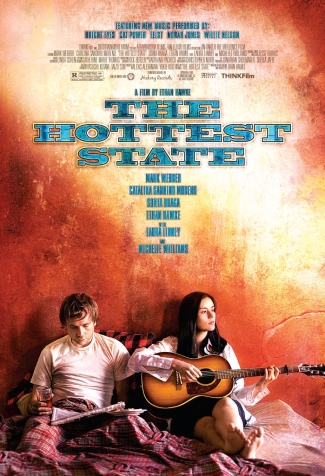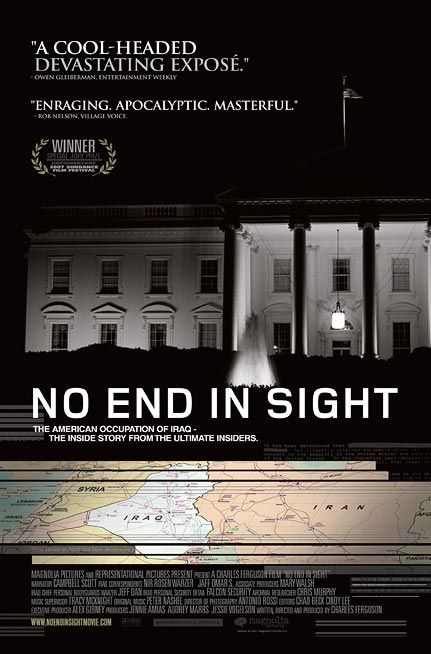 THE HOTTEST STATE (2006, directed by Ethan Hawke, 117 minutes, U.S.)
THE HOTTEST STATE (2006, directed by Ethan Hawke, 117 minutes, U.S.)
NO END IN SIGHT (2006, directed by Charles Ferguson, 102 minutes, U.S.)
BY DAN BUSKIRK FILM CRITIC
For a guy who has been acting in films for over 20 years, something about Ethan Hawke remains uneasy on the motion picture screen. The characters Hawke specializes in are often cocky, moping cads who suffer easily and whose angst-ridden intellect has not won themselves any inner peace. My feelings toward the men he portrays has inescapably bled over into my thoughts about the actor as well, sensing him strain for a gravitas that doesn’t come naturally to that generation whose character was forged in the carefree Clinton years. And dumping Uma Thurman? That’s more than enough to alienate him from many a red-blooded heterosexual man.
I’ve heard others groan at his name as well, but somehow I think this prejudice is my problem more than his. In fact I’ve enjoyed his Richard Linklater romantic gab fests (Before Sunrise and its sequel Before Sunset, both of which Hawke co-wrote) as well as his modernist take in Michael Almereyda’s Hamlet, where his youthfulness helped define the young Prince’s indecision. The memory of these successes however was not enough to quell the cynical gremlins brewing in my head on the way to see his sophomore directorial effort, the romantic drama The Hottest State. Based on his first novel, this nicely shot feature gives Hawke a showcase to wear his writer/actor and director caps all in one film. It seemed like this could be too much Hawke for any one film to digest.
Yet it was only 15 minutes in when I was able to sweep aside all my biases and begrudgingly admit that Hawke was on to something special with this intimate and well-observed look at the visceral intensity of first love. The story of William (Mark Webber), an up-and-coming 20-year-old New York actor, and his smothering love for the alt-country singing Sarah (Maria Full of Grace’s Catalina Sandino Moreno) is bound to bring up a rush of memories of the first time you dropped all dignity in the name of mad passion.
The story is nakedly autobiographical and Hawke allows his stand-in to recreate every stupid, desperate romantic mistake that must have made as a young man. When Hawke first wrote this story, a decade ago, he probably imagined himself in the lead but the film is much better off with the Philadelphia-born Webber at its center. Looking like a young Dwight Yoakam — thinning hair and all — Webber finds a sleepy-eyed charm Hawke would have been hard-pressed to locate, and he does it without compromising all that is infuriating and embarrassing about him. When things first heat up physically between William and Sarah, she tries to turn down the temperature by warning him “Do you want to get me pregnant!?!” “Yes!” he says sincerely, capturing both an earnest vow of commitment and a lover in a self-deluded fantasy. If Hawke and his proxy are self-absorbed, at least they aren’t unaware of their shortcomings. “I don’t know how men are supposed to act alone with women . . .” he says more than once, like an actor lost without the safety of a script.
Moreno fits in perfectly as the first love, her halting English (a fact that is pleasantly unaddressed) giving this strong woman a deceptive appearance of vulnerability. Instead of drawing Sarah as fickle or deceitful, Hawke mostly leaves the blame of their collapsing relationship squarely at the feet of William — a decent young guy whose unresolved turmoil would foil the most patience of most women. When things get bad and William sinks to a needy, begging string of answering machine messages you could hear the audience groaning loudly, like they’d just turned a photo album page and saw themselves with a new-wave hairdo and acid-washed jeans. The romance genre is usually as much about fantasy as any sci-fi flick. At its best Hawke’s little film captures the light-headed feeling of transcendent love, yet it also dares to confront us with the moment when a person realizes it’s not so easy to transcend oneself.
——————————-
No End In Sight is latest documentary to address the Iraq invasion, and I’m still a little surprised that people are so starving for this information that it has played in local theaters for nearly a month now. This sort of unflashy and sober analysis of how this war started should have a place on one of our 300 television channels, yet week after week people are willing to pay the admission price to be better informed on what the hell is going on over there.
Bless their souls, because the story told is none-too-pretty. No End In Sight covers the same ground as Hijacking Catastrophe or Uncovered: The Whole Truth About the Iraq War and those films are now over a year old. The news here is that in 2007 you can construct the same video hypothesis (basically that we were suckered into a war that was badly botched) only it is now respectable Republican types from the Pentagon and the government voicing the same ideas Noam Chomsky and Howard Zinn were saying four years ago. People may disagree on where to go from here but it seems like only those personally involved are defending the U.S.’s pre-war and post-war planning.
Hijacking Catastrophe or Uncovered: The Whole Truth About the Iraq War and those films are now over a year old. The news here is that in 2007 you can construct the same video hypothesis (basically that we were suckered into a war that was badly botched) only it is now respectable Republican types from the Pentagon and the government voicing the same ideas Noam Chomsky and Howard Zinn were saying four years ago. People may disagree on where to go from here but it seems like only those personally involved are defending the U.S.’s pre-war and post-war planning.
No End In Sight uses what is now the basic documentary shorthand, supplying all the bad news and introducing all the villains while a dull drone buzzes on portentously underneath them (Rumsfeld falls right into their hands; listening to him gloat while mayhem roars makes him seem absolutely Satanic) as the film darts between video and film formats like a souped-up Oliver Stone docudrama. If you were unfamiliar with the story it might play like a late-summer potboiler, with a nefarious cell of evildoers laying siege on the U.S. war machine to enslave the world like they were James Bond bad guys.
But I was troubled by the filmmaker’s conclusions as well. After carefully laying out an endless case of careless incompetence, the film ends with the handsome and earnest Marine, Lt. Seth Moulton looking at the camera and saying “Is this the best we can do? I don’t think so,” biting those last words with a steely determination. It was only then I realized that No End In Sight never challenged our right to brings the dogs of war to Iraq, it just wants us to shape up and do the job better. U.S. opinion polls show that the public is more than ready to bring the soldiers home but No End In Sight is arguing for strategy adjustment at best. Most ominously, it sounds eerily like the point of view of the Democratic presidential front-runners. The film’s director may be clucking his tongue at the warmonger’s endless conflict, but it doesn’t sound like he has the guts to imagine an ending either.
